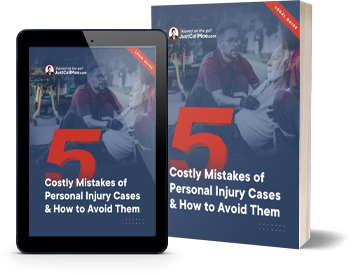Florida Pharmacy Malpractice Lawyer
Pharmacy malpractice is a significant problem that can have serious or even fatal consequences. Given the sheer volume of prescriptions filled daily in Orlando, Florida, errors are bound to occur. It’s essential to understand your legal options and rights in cases of pharmacy malpractice.
We have unique experience when it comes to handling pharmacy malpractice cases. One of our Orlando attorneys is also a Doctor of Pharmacy. This exceptional blend of legal and medical experience makes us uniquely equipped to evaluate and handle pharmacy malpractice cases. Having a dual background offers an in-depth understanding of the intricacies of both the medical and legal aspects of such cases. This understanding helps us in comprehending complex pharmaceutical processes, recognizing where mistakes may have occurred, and identifying negligence. It also assists in effectively communicating with medical experts and interpreting medical documents. This specific skill set allows us to offer a comprehensive approach to evaluate pharmacy malpractice cases.
Understanding Pharmacy Malpractice
Pharmacy malpractice occurs when a pharmacist or pharmacy technician makes an error that causes harm to a patient. Common types of errors include dispensing the wrong medication, incorrect dosage, failure to check for harmful drug interactions, and not providing proper instructions. These mistakes can lead to serious health issues, such as allergic reactions, overdoses, or ineffective treatment of an existing condition.
As patients, we place immense trust in our pharmacists. They are the last checkpoint between us and potentially harmful medication errors. Hence, any oversight on their part can have severe repercussions on our health and wellbeing. Your medicine is supposed to make you better, not hurt you more!
Common Pharmacy Malpractice and How to Spot Them
The advent of modern medicine has revolutionized our health care, with the pharmaceutical industry playing a crucial role in this landscape. Every day, pharmacies around the world dispense countless medications that save lives and improve patient outcomes. However, as with any field involving human decision-making, errors do occur. When these errors lead to harm, it’s known as pharmacy malpractice.
Pharmacy malpractice might not be as widely recognized as medical malpractice, but it has equally serious implications.
Wrong Medication Dispensed: One of the most common and potentially harmful forms of pharmacy malpractice is when a patient receives the incorrect medication. This can occur due to miscommunication, confusion over similar drug names, errors in the prescription, or even mislabeling. Taking the wrong medication can lead to serious health issues, particularly if the patient has an allergic reaction or if the incorrect drug interacts negatively with other medications they’re taking.
Incorrect Dosage: Another typical example of pharmacy malpractice is when the pharmacist provides the wrong dosage of a medication. This could be due to misreading the prescription, typographical errors, or even a misunderstanding of the drug’s correct dosage. An incorrect dosage can be incredibly harmful, with an overdose leading to toxicity and severe side effects, including death. An underdose may also fail effectively treat the patient’s condition causing the underlying issue to worsen causing more harm to the patient.
Failure to Identify Drug Interactions: Pharmacists play a critical role in identifying potential harmful drug interactions. Sometimes, patients receive prescriptions from multiple doctors who might not be aware of all the medications the patient is taking. If a pharmacist fails to flag a potential interaction, it could be considered pharmacy malpractice.
Failure to Counsel: Pharmacists have a duty to provide necessary counseling to patients about their medications, including how and when to take it, potential side effects, and what to do in case of a missed dose. If a pharmacist neglects this duty, the pharmacist could be held liable for malpractice.
Providing Expired Medications: Pharmacies are responsible for ensuring that the medications they dispense are not expired. Using expired medication may not only be ineffective but could also cause harm to the patient.
Failure to Consider Patient Allergies: Pharmacists should always check a patient’s known allergies before dispensing a medication. Providing a medication that the patient is allergic to can have severe or even fatal consequences.
While pharmacies and pharmacists generally provide a vital and reliable service, mistakes can happen. As patients, it is important to remain vigilant, always double-check your medication and dosage, ensure your pharmacist is aware of all medications you’re taking, and know your allergies. If you suspect you’ve been a victim of pharmacy malpractice, call us to discuss your options and your rights.
Proving Pharmacy Malpractice
If you believe that you’ve been a victim, you’ll need to prove four key aspects: duty, breach of duty, causation, and damages.
Duty: You must demonstrate that the pharmacy had a duty of care towards you. This is generally easy to establish, as once a pharmacy agrees to fill your prescription, they have a legal obligation to provide accurate and safe service. This duty includes correctly filling prescriptions, checking for drug interactions, and providing proper instructions for use. They are also responsible for ensuring that the drugs they dispense are not expired and are safe for use given a patient’s known allergies.
Breach of Duty: You’ll need to show that the pharmacy breached this duty of care. This could mean they dispensed the wrong medication, provided an incorrect dosage, failed to warn about potential interactions, or neglected to give appropriate usage instructions. Documented proof like the wrong medication or dosage on the pill bottle compared to the prescription, or testimony from an expert witness, can be used to establish this breach.
Causation and damages: You must establish that the pharmacist’s negligence directly resulted in harm. This could be an adverse reaction, the worsening of an existing condition, or even the development of a new condition due to taking the wrong medication or dosage. Additionally, you must show that you suffered actual harm or damage due to this error. This might be in the form of medical bills, lost wages due to inability to work, or pain and suffering. Demonstrating these aspects often requires medical records and expert testimonies. Remember, it’s not enough to show that the pharmacist made a mistake; this mistake must have directly led to your injury and resulted in actual damages.
How Can an Attorney Help with Pharmaceutical Malpractice
An attorney plays an instrumental role in handling a pharmacy malpractice case. An attorney can guide you through the legal process and fight to get you the compensation that you deserve.
Case Evaluation: An attorney can help you determine the viability of your case. They can review your situation, medical records, and pharmacy details to assess whether a case of pharmacy malpractice exists and whether it can be proven.
Gathering Evidence: Lawyers are skilled at collecting and preserving critical evidence to support your case. This can include medical records, witness statements, pharmacy records, and expert testimony.
Expert Testimony: In pharmacy malpractice cases, expert testimony is often required to establish what the standard of care should have been and how it was breached. An experienced attorney will have connections with medical experts who can provide this testimony.
Negotiating Settlements: Most pharmacy malpractice cases are settled out of court. A skilled attorney will negotiate with the pharmacy’s insurance company or legal team on your behalf, ensuring you get a fair settlement.
Litigation: If a fair settlement cannot be reached, your attorney will represent you in court. They will present your case in the most compelling way possible, fighting for your rights and seeking maximum compensation. The insurance companies know the attorneys that are willing to take them to court and those who will take the last best settlement offer.
Understanding the Law: Laws related to pharmacy malpractice can be complex in Florida. Our Orlando Pharmacy Malpractice attorney is also a Doctor of Pharmacy as she holds a professional doctorate degree in Pharmacy. This allows us to thoroughly evaluate pharmacy malpractice claims having an in-depth knowledge of the standard of care pharmacists are required to uphold.
If you believe you have been a victim of pharmacy malpractice in Orlando, Florida, we are here to help. Our experienced team of injury attorneys can evaluate your case, provide you with legal advice, and guide you through the entire legal process. Reach out to us today for a free consultation.
Frequently Asked Questions:
What counts as pharmacy malpractice?
Pharmacy malpractice is any error made by a pharmacy that leads to patient harm. It could be as straightforward as dispensing the wrong medication or more complicated like failing to identify harmful drug interactions. The key element is that there must be harm or injury to the patient resulting from the pharmacy’s error.
Can I sue a pharmacy for malpractice in Orlando, Florida?
Yes, you can sue a pharmacy for malpractice in Orlando, Florida. However, you need to demonstrate that the pharmacy was negligent and that this negligence caused your injury.
How long do I have to file a pharmacy malpractice lawsuit in Florida?
Florida’s statute of limitations for medical malpractice, including pharmacy malpractice, is two years from when the patient (or sometimes a particular family member or guardian) either knew, or should have known with reasonable diligence, that the injury has occurred and there is reasonable possibility that the injury was caused by malpractice.
What damages can I recover from a pharmacy malpractice lawsuit?
If you win a pharmacy malpractice lawsuit, you might be entitled to compensation for medical expenses, lost wages, pain and suffering, and in some cases, punitive damages.
Can I sue if the pharmacy gave me the wrong medication, but I didn’t get injured?
Typically, to bring a successful malpractice lawsuit, you need to demonstrate that you suffered harm. If you didn’t experience any adverse effects, it would be challenging to claim damages.
How common is pharmacy malpractice?
While exact numbers are hard to pinpoint, studies suggest that medication errors, many of which occur in pharmacies, injure more than million people in the United States each year. It’s a significant issue that deserves more attention.
Florida Auto Accident Lawyer
You Don't Pay, Unless We Win.

When you've been injured in an accident, you're likely dealing with much more than just your injuries and property damage. Dealing with your insurance claim can be an added stressor that you shouldn't have to worry about. When you call us, we'll take the burden of dealing with the insurance companies off your shoulders. We'll deal with the insurance company, so you can focus on getting better.
About Us Play Video
 (866) 225-5663
(866) 225-5663



